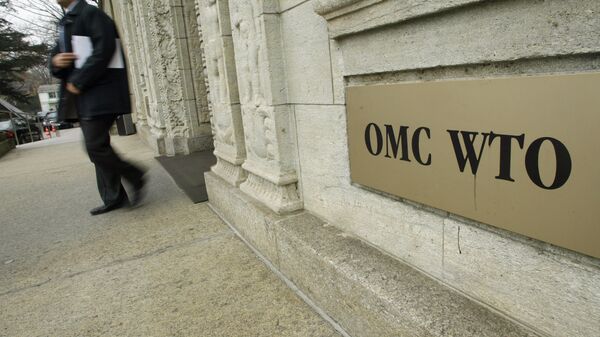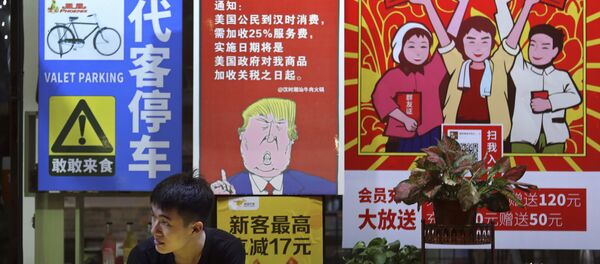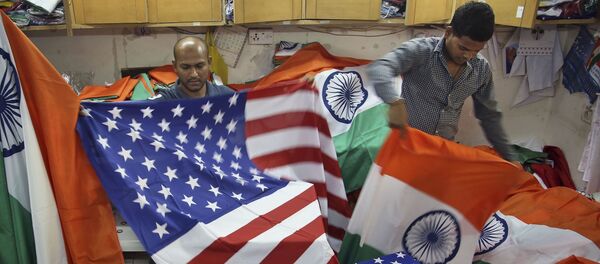New Delhi (Sputnik): India's demand to amend laws to prevent developed countries from taking unilateral action on global trade issues to the detriment or disadvantage of lesser developed or underdeveloped countries within the WTO system is fully justified, Manoj Pant, a foreign trade analyst in New Delhi, told Sputnik.
Responding to India's proposal to safeguard the right of special provisions for developing countries, already challenged by the US, a New Delhi-based economist and director of the Indian Institute of Foreign Trade (IIFT), Professor Manoj Pant, said that all developing or underdeveloped countries have a right to receive special and differential treatment (S & DT).
He said they should be given time to implement bilateral and multilateral trade agreements and commitments.
Stating that it is "obviously justified because the logic of S & DT is that it is essentially an undertaking", Professor Pant told Sputnik: "Time should be given to a country or countries to adjust to existing as well as new trade or commercial regimes. It is essential to understand that all countries cannot adjust to the same rate".
READ MORE: Prof on US Cuba Policy: 'Very Unpredictable' Strategy of Regime Change
The observation assumes significance against the backdrop of India hosting representatives of 25 developing countries at a two-day mini-ministerial meeting between 13 —14 May in the national capital New Delhi. The meet will involve deliberations on several issues related to the World Trade Organisation (WTO).
Earlier visuals of WTO (World Trade Organisation) Ministerial meeting being held in Delhi. pic.twitter.com/Xsu9ZrO6O4
— NewsMobile (@NewsMobileIndia) May 13, 2019
Stating that S & DT was brought in way back during the Uruguay Round (of WTO talks), Professor Pant said: "S & DT must be continued because that is the only way countries can and must adjust. Special and differential treatment has been given or allowed as a kind of safety to allow countries to adjust to changing disciplines… It is a kind of credit adjustment".
READ MORE: Analyst Explains Why European-US Trade War Matters to China
Several countries, including China and South Africa, have in the recent past questioned the relevance of the WTO in the context of ensuring a level-playing field in global trade. Many countries have been taking protectionist measures that have had a significant impact on global trade.
READ MORE: Trump-Imposed Indo-US Tariff War is a 'No-Win Situation' — Economist
The Indian proposal is reportedly focused on S & DT measures that allow for longer time-periods to implement agreements and commitments, adequate measures to increase trading opportunities, introduction of provisions to safeguard trade interests, and build sufficient capacity to handle disputes and implement technical standards.
"South Africa and China are excited about our proposal and the meeting", an unnamed official told the Indian daily Economic Times, adding that India may consider modifying its proposal to meet the requirements of other countries.
Washington believes countries that are members of the OECD (Organisation for Economic Cooperation and Development) or the G20 (Group of 20) and are classified as "high income" by the World Bank, and account for more than 0.5 percent of global merchandise trade, should not be given special rights or exemptions. It views these countries as emerging economies.
READ MORE: EU Threatens WTO Action as Trump Plans to Tighten Cuba Sanctions
The 14th G20 Summit to be held in the Japanese city of Osaka from 26 —29 June may witness India taking a strident stand against countries wanting to initiate new or amended global rules in e-commerce. Whatever the outcome of the G20 talks, the impact could be felt at the next round of the WTO talks.
"We want to have development through S & DT, as the core of WTO reform, along with appellate body appointments. We will also discuss ways to address asymmetries in various global trade agreements especially on agriculture", the Economic Times quoted an official as saying.
Views and opinions expressed in this article are those of the speaker and do not necessarily reflect those of Sputnik.




